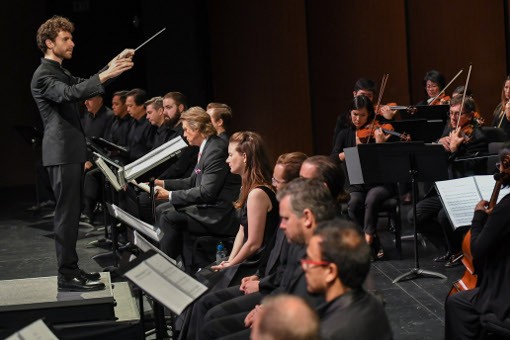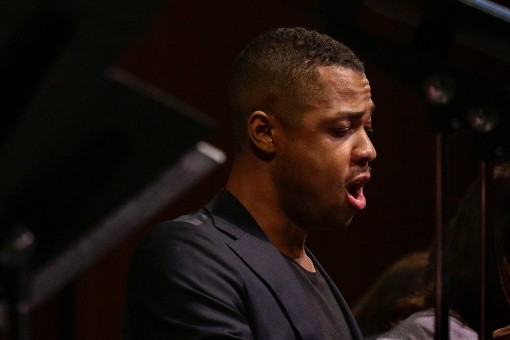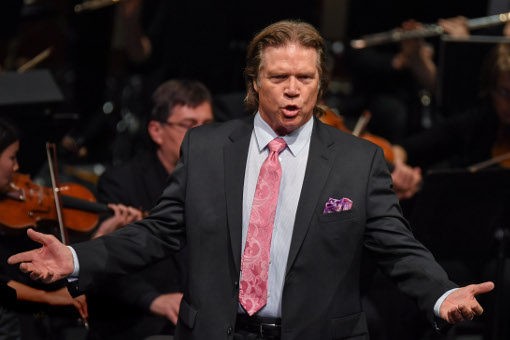In an adventurous foray out from their downtown home, LA Opera’s experimental Off Grand series “in concert” performance of Matthew Aucoin’s Crossing took over Bram Goldsmith Theater at the Wallis Annenberg Center for the Performing Arts in the wilds of Beverly Hills. Crossing’s genuinely operatic flow wound confidently through a series of instrumental introductions and interludes connecting the formal scenes, while Aucoin’s endlessly imaginative toolkit of effects and sublime playing by members of the LA Opera Orchestra – conducted by the composer – created an absorbing aural landscape for an intense but ultimately diffuse intellectual melodrama.
Described as an “operatic fantasy” based on Walt Whitman’s experiences as a volunteer nurse during the Civil War, Crossing uses a fictional affair with a wounded young soldier to enter the great writer’s resplendent, mostly philosophical inner life. In the 800-seat hall’s painfully intimate surroundings Aucoin’s relentlessly pulsing, pulsating music and Whitman’s poetry together took the audience beyond narrative, riding emotional waves of intensity into the literal prison where Whitman is incarcerated, whose people need be seen, touched, and loved in order simply to exist, after which the most terrible consequences begin for those who remain.

The role of Walt Whitman was made for a baritone who can command the stage before he sings a note, and so once the 6’3” Gilfry let forth with his wonderful, golden tones in the first of his conversations, arias and ensemble pieces the night was his. The effect was heightened by Gilfry’s expensive-looking suit and powerful physique which, set against the monotone inmate uniforms of the 12 tenors, basses and baritones seated in chairs across the front of the stage, emphasized the gulf between the artist momentarily intruding into hell and the eternal damnation of its permanent residents. Throughout Gilfry strode the stage like a literary lion in mufti, slowly becoming aware of and processing the conflicts he feels between the night he spends with the soldier and his need as a journalist to remain a dispassionate observer, to balance his flirtation with the real but ephemeral and the eternally sad and tragic.
As one of the most sad and tragic characters, Brenton Ryan elevated and sanctified the far more complex role of the the invalided soldier, named John Wormley and pronounced like the invertebrate to reflect his coward’s existence. The part is mostly ungrateful to sing, symbolic of his broken body, but the determination of his fury leads to stretches of magnificent singing, exploring his character’s existence, occasionally using an affecting melismatic effect to further express and individualize his terrible destiny. Before the final chorus, a dying Wormley and a now paternal Whitman bond in a transformational scene, the music alive with spiraling riffs and elegiac vocal lines.

In brief but telling solo roles, Davóne Tines made an unforgettable impression as a brooding, fateful, eloquent Freddie Stowers, born a slave in South Carolina who escaped at 13 and later joined the Union forces, and Liv Redpath as a messenger of peace sang her celestial vocalise with exquisite, haunting beauty, while the charm of her physical presence radiated throughout the hall.
Aucoin, who had bounded onto the podium at the start and rarely stopped bounding after, conducted with the balletic deftness that left-handed conductors, like lefty athletes, often seem to have. In the small auditorium in a community cultural center with burgeoning cultural aspirations, the shy, impetuous bows the cast took afterwards had an endearing, homespun quality.
























